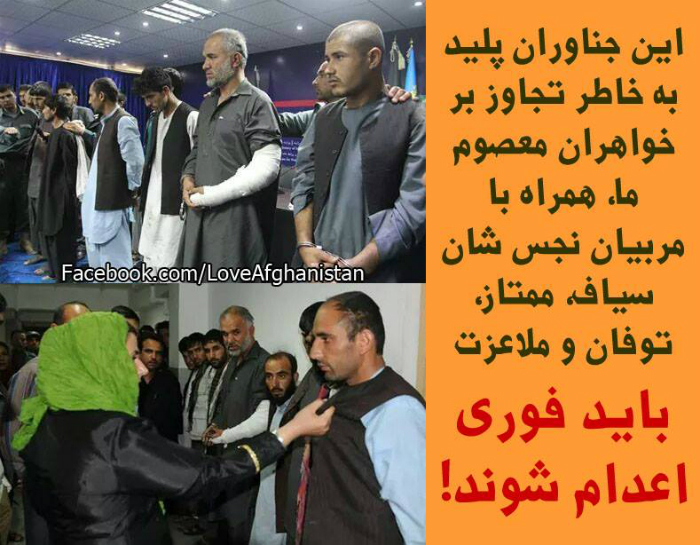By Margherita Stancati & Habib Khan Totakhil

A post circulated on Facebook calling for the execution of the rapists (top), with one of the victims identifying her rapist in the photo below. The post says: These filthy animals should be executed for raping our innocent sisters along with their notorious mentors Sayyaf, Mumtaz, Toufan and Mullah Izzat. The four named are infamous warlords who control the area in Kabul these women were raped in, and are probably behind these men. These four criminals have a gruesome record of their men committing the same crimes and worse during the 1992-96 civil war (Photo: Facebook.com/LoveAfghanistan)
KABUL — News of a gang rape rattled the Afghan capital, stirring fears of a return to lawlessness amid a prolonged political crisis that is threatening to plunge the country into civil war.
Afghan police said this week they arrested six men in connection with the rape, which took place in the early-morning hours of Aug. 23. The announcement of the arrests sparked an outpouring of rage in Afghanistan, with social-media campaigns calling for a harsh punishment of the culprits.
According to Kabul police officials, a group of men wearing police uniforms and armed with Kalashnikov assault rifles stopped a convoy of cars that was driving back to the city from a wedding in the district of Paghman on the night of the rape.
The armed men dragged four women to the side the road, where they robbed them and beat them up, the screams of the victims in earshot of male relatives they were traveling with. Three of the women were raped, including one who was pregnant.
Jamshid Totakhil, a senior Kabul police official, said all six of the men arrested were charged and had confessed to being involved in the rape. None of the accused were reachable to comment. Police said the six men aren't police officers.
Afghan President Hamid Karzai called for the prompt execution of those found guilty, according to his spokesman, Aimal Faizi.
"It's the main topic of conversation," said Shaharzad Akbar, a civil-society activist. "In recent years, nothing quite like this has happened, at least not so close to Kabul."
In photos released Wednesday by Kabul police, the women, whose identities were withheld, are shown pointing to suspects lined up against a wall. One of them, in an all-covering blue burqa, tugs at the shirt of one of her alleged assailants, while another uses a wooden stick to single them out.
Violence against women is common in Afghanistan, but most of it happens within the home. "What's unusual about this case is that it came to light. [Rape] is far more common that we would know because people don't talk about it," said Patricia Gossman, a senior researcher with Human Rights Watch. "There is an enormous social stigma."
For many Afghans, this case also rekindled memories of the civil war of the mid-1990s, when law and order collapsed as rival mujahedeen groups battled for control of Kabul. At that time, women were frequently abducted and gang raped.
"This incident reminds us of violence against women during the civil war—that's why people are very sensitive about it, and want to push the government to take serious action," says Najma Zala, a Kabul-based women's rights activist. "We don't want to return to that same era again."
The U.S. Embassy in Kabul called on Afghan judicial bodies "to ensure that the perpetrators are brought to justice, and we commend the Afghan government for protecting the basic rights of women and girls."
In recent months, a disputed election has triggered a prolonged political crisis that stoked fears of a return to the bloodshed. U.S.-led efforts to break the political deadlock have been unsuccessful. The results of a June 14 runoff vote were inconclusive, with presidential candidate Abdullah Abdullah alleging widespread fraud took place in favor of his rival, former finance minister Ashraf Ghani. While the candidates in principle agreed to share power, no consensus has been reached on forming a government.
Earlier this week, Mr. Abdullah's camp threatened to effectively withdraw from the electoral process, with members of his team saying they were ready to take to the streets and occupy government buildings if their demands weren't met.
The dispute has ethnic overtones: Mr. Abdullah, who is of mixed Tajik and Pashtun heritage, draws most of his support from the country's north and west, while Mr. Ghani is a Pashtun with roots in the east.
Some, like Cina Wardak, a mother of four, see the Kabul rape case as a product of the deteriorating security and rising crime levels that have marked this period of uncertainty.
"I was so shocked—this is something that happened during the mujahedeen years," said Ms. Wardak, who was a teenager in Kabul at the time of the civil war. "I thought that the Afghan police was strong now, I never thought this could happen again."



